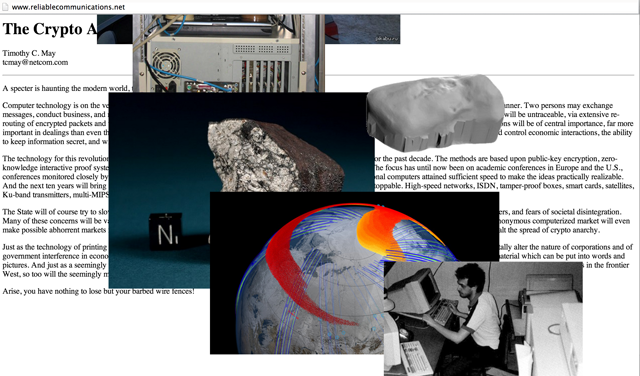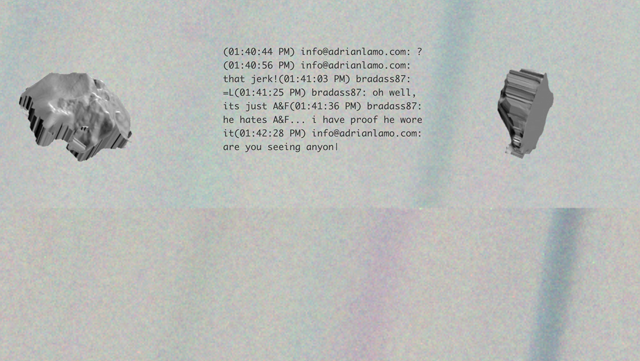If you consider the fate of Chelsea Manning and Ed Snowden, the physical consequences of your virtual actions are extremely real. Jailed and exiled for what can be reductively referred to as “file sharing”, the two US dissidents –respectively charged with “aiding the enemy” and accused of treason –had their lives and freedom irrevocably altered. For London and Berlin-based artist Yuri Pattison the parallels between said contemporary resistance and the August Putsch of 1991 are endless.
Most importantly, the faction of Communist hardliners plotting to overthrow Soviet President Gorbachev (along with his liberalising move towards decentralising government in an effort to prevent the collapse of the USSR) suppressed local and international broadcasting of the event, only to be undermined by Russia’s first computer and information network, RELCOM (РЕЛКОМ). The coup failed, the new union treaty never signed and the Soviet Union dissolved four months later.
These days and this side of the Iron Curtain there’s Swedish “free-speech” ISP Bahnhof to thank for WikiLeaks and The Pirate Bay, the same server to host Pattison’s RELiable COMmunications website –a commission by LEGION TV and jumping-off point for what’s to be realised as a physical book, published by Arcadia Missa in March. Here, the virtual and its real-world ramifications interweave, interact and fold over on to each other in the form of the Chelyabinsk meteor and its fragments, dropped from space, into Russia, on to eBay and back through the digital network to Pattison’s 3D printer and the exhibition floor. There are some CGI models of said cosmic bodies floating across the browser of RELiable COMmunications, where layer upon layer of ftp archival content, First Gulf war chat logs, a server, a diagram of the meteor route, are thrust into chaos.
All linearity and narrative, ‘sense’ as we know it, collapses into a glut of information that demands user engagement in order to make a connection. There’s no streamlining here, no Google algorithms to shape our identities and reinforce our pre-existing ideas. Instead, it’s The Crypto Anarchist Manifesto that hovers in the background. Dating back to 1992 and posted by writer and engineer Timothy C. May, said proclamation of cyber-spatial autonomy makes some eerily accurate predictions of the future. That is, our present.
“The State will of course try to slow or halt the spread of this technology, citing national security concerns… and fears of societal disintegration,” May warns, while, suggesting that, just as printing diminished the existing power structures of the Middle Ages, “cryptologic methods” will do the same for the here now. It will “alter the nature of corporations and of government interference” by creating “a liquid market for any and all material which can be put into words and pictures”.
In RELiable COMmunications, the August Putsch, PRISM, Chelyabinsk meteor and May’s early 90s Manifesto are experienced all at once. In the same way that proponent of the Singularity Ray Kurzweil’s experiments in nanotechnology evoke an eerie sense of Sci-Fi déjà vu, so too does RELCOM-become-Relcom Business Network Ltd echo the modern corporatised Internet. History doesn’t just repeat itself, it exists all at once and its up to the user break the cycle.

Why the allusion to RELCOM?
Yuri Pattison: I really enjoyed how transparent all these communications were. You didn’t really have the same sort of internet etiquette, so you had a lot of personal correspondence. It’s very personal in terms of history and, in that sense, it encapsulated the aspirations of what the internet could do; how it could serve a greater good within society.
Now you have the inverse of those communications. Of being very much manipulated and used by governments and by companies in a very controlling and imperialistic way. I found it really interesting that RELCOM came out of something as restrictive as the Soviet Union; even when it was being opened up, it was a government scheme. It came out of that environment but then it offered incredible potential in terms of movement and freedom of information. It had different aspirations to the previously restrictive Soviet regime.
It’s interesting that that sort of free network, that would later become what we know as the internet, came from such a restrictive regime, while now, within a globalised and supposedly ‘free’ world, the internet is having the opposite effect.
YP: That’s the thing. In the early days, it wasn’t taken seriously. It wasn’t restricted and it was a completely free zone. Now we’re in a position where the internet has had such an influential and dominant effect on society; where it does control many things that we do in our day-to-day lives. It’s actually had an inverse effect and it really has real-world consequences. If you’re doing things that are political online, that goes pretty deep. It’s come from something that was so unrestricted and become something that has really deep implications.
You could even say that’s reflected in your own evolution as an artist. Where you’ve started in fine arts, without a computing background, and wound up concentrating on digital culture five years later.
YP: I think most artists of our generation are using the internet. It’s become such a day-to-day tool, for general communication but also for research, and I think it’s really important to acknowledge that, in some way, within the work. I found it’s important to be much more honest about what is the right sphere to show the work within. I think the physical works do acknowledge the internet and the online works fold that information back on to the physical. I don’t feel I can avoid that. It would be a much more obtuse to try to ignore that the internet exists. Digital culture has had such a huge impact on society and it is very much a major part of society now.

I guess another parallel between RELCOM and the internet now is in the physical ramifications of online behaviours. Obviously, there’s Snowden and Manning now, while although the Putsch itself failed, it arguably marked the beginning of the end for the Soviet Union.
YP: That’s the thing, the coup was conceived by hardliners and they wanted to actually re-retrict the Soviet Union, bring it back to the darkest Cold War days, and it kind of ended up really speeding up the dissolution of the Soviet Union. I mean, in some ways we’re still in a very weird Post-Soviet vacuum and you have the ghosts of the Cold War very much within the Snowden and Manning revelations.
The internet is a political space and there’s no way to avoid that but I think the political within the work also very much has this metaphorical element to it all. It illustrates how important this space is; of being very much an extension of reality and the real-world implications things happening in that space have.
You mentioned Science Fiction and how what was written about in the 60s and 70s has come to be. In terms of how memory is experienced in a very horizontal, non-linear way in this new space, that has some interesting implications about how we experience time.
YP: Yeah, you end up with this weird feeling of déjà vu. There are many things in the present that were these fantasies for us growing up and it’s particularly strange for earlier generations. A really good example that summed all of this up for me is this very creative hoax, which is John Titor.
There are postings on various chat forums where he claimed to be someone from the future who had come back to the present, his past, to solve the problems that were facing us. He was talking about imminent events that were going to happen in the mid-to-early 2000s but it very much read in a way that it was Science Fiction in action. It was about the present and our near future that was very much rooted in the internet. I just saw parallels between a lot of the structures of Science Fiction and how those have collapsed entirely due to the rate of change that we’ve been experiencing.

Thinking about this ‘collapse’ in terms of the Singularity, and how Chelyabinsk meteorites were being sold on eBay. It’s almost like the ultimate realisation of consumer capitalism; it’s even claiming that final frontier of outer space. Meanwhile, Kurzweil is literally talking nanotechnology and artificial intelligence with Google. It all seems to be rapidly converging towards this predicted explosion of superintelligence.
YP: Yeah, he’s very much thinking about conquering time. I think time is much more the last frontier for him. That’s been a human obsession forever: ‘how do you conquer time? How do you jump past your flesh existence?’ I think there are elements in all of this where the internet has very much collapsed that.
Oral history exists, in a written way, on the internet. You just have to find those layers and expose them. I was trying to conceive that in a world that has this longer timeline, that sort of exists going forward forever and knowing that you’ll have a sort of network that will negotiate these spaces in many ways and how our perceptions of time will change.
RELiable COMmunications is quite visually layered and hard to navigate, in a way. Is that a sort of reflection the sort of garbled reconstruction and retelling of narratives within oral culture?
YP: Yeah. When I was reading these chat logs, they’re kind of written oral histories and they become slightly impenetrable because of their formatting and now they just exist as raw text files. In a way, the site is my representation of it. That is my experience of it but it’s also a way of trying to reformulate them in a different way. In taking the elements of the current internet –which is much more dynamic, flashy and generally orientated to selling you something –then taking fragments of the previous internet –which was very much a non-commercial space –and putting those two things together. I wanted it to be a space that you would discover things and make new connections.
I was basically trying to reformat how that space on the internet worked, into a productive space, because I’m finding it increasingly difficult with the way Google and search engines streamline your access to data, you’re only being fed information based on your previous searches. You don’t have these moments of revelation, something new and relevant that you haven’t discovered yet, or haven’t searched yet, that is outside your bubble. I was trying to burst that bubble a bit with this piece because a lot of the information I had acquired was too much for me to find those connections with in a meaningful way.
In your mention of the frustrations of streamlining searches, there are so many implications. Firstly, the internet in some ways has been paved over with a particular narrative history, but it’s also really reifying and reinforcing certain cultural, racial, gendered, assumptions and misconceptions by limiting users to a particular stream and thus perspective.
YP: For sure. I’ve tried to find ways around it but it is having quite a ghettoising effect on information, particularly from a contemporary art point of view. If you’re searching things in an art context then if you search other things and they have an art context you will get fed that information. Rather than maybe the more relevant information that stimulates new thoughts and new experiences. I think a lot about the ‘filter bubble’ and it’s interesting that Google continues to reinforce their thoughts on what’s useful. There are lot of people working for Google, including Ray Kurzweil, who don’t believe in those things. They believe in new experience and the endless possibility the network has, rather than the very personal, local possibility of tailored searches. **
Yuri Pattison’s RELiable COMmunications will be developing until May 31 and Arcadia Missa will publish a book in March, 2014.













